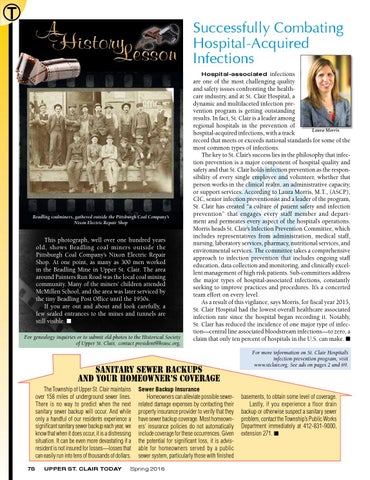A History Lesson
Beadling coalminers, gathered outside the Pittsburgh Coal Company’s Nixon Electric Repair Shop
This photograph, well over one hundred years old, shows Beadling coal miners outside the Pittsburgh Coal Company’s Nixon Electric Repair Shop. At one point, as many as 300 men worked in the Beadling Mine in Upper St. Clair. The area around Painters Run Road was the local coal mining community. Many of the miners’ children attended McMillen School, and the area was later serviced by the tiny Beadling Post Office until the 1950s. If you are out and about and look carefully, a few sealed entrances to the mines and tunnels are still visible. n For genealogy inquiries or to submit old photos to the Historical Society of Upper St. Clair, contact president@hsusc.org.
Successfully Combating Hospital-Acquired Infections Hospital-associated infections are one of the most challenging quality and safety issues confronting the healthcare industry, and at St. Clair Hospital, a dynamic and multifaceted infection prevention program is getting outstanding results. In fact, St. Clair is a leader among regional hospitals in the prevention of Laura Morris hospital-acquired infections, with a track record that meets or exceeds national standards for some of the most common types of infections. The key to St. Clair’s success lies in the philosophy that infection prevention is a major component of hospital quality and safety and that St. Clair holds infection prevention as the responsibility of every single employee and volunteer, whether that person works in the clinical realm, an administrative capacity, or support services. According to Laura Morris, M.T., (ASCP), CIC, senior infection preventionist and a leader of the program, St. Clair has created “a culture of patient safety and infection prevention” that engages every staff member and department and permeates every aspect of the hospital’s operations. Morris heads St. Clair’s Infection Prevention Committee, which includes representatives from administration, medical staff, nursing, laboratory services, pharmacy, nutritional services, and environmental services. The committee takes a comprehensive approach to infection prevention that includes ongoing staff education, data collection and monitoring, and clinically excellent management of high risk patients. Sub-committees address the major types of hospital-associated infections, constantly seeking to improve practices and procedures. It’s a concerted team effort on every level. As a result of this vigilance, says Morris, for fiscal year 2015, St. Clair Hospital had the lowest overall healthcare associated infection rate since the hospital began recording it. Notably, St. Clair has reduced the incidence of one major type of infection—central line associated bloodstream infections—to zero, a claim that only ten percent of hospitals in the U.S. can make. n
Sanitary Sewer Backups AND your homeowner’s coverage The Township of Upper St. Clair maintains over 158 miles of underground sewer lines. There is no way to predict when the next sanitary sewer backup will occur. And while only a handful of our residents experience a significant sanitary sewer backup each year, we know that when it does occur, it is a distressing situation. It can be even more devastating if a resident is not insured for losses—losses that can easily run into tens of thousands of dollars. 78
UPPER ST. CLAIR TODAY
Sewer Backup Insurance Homeowners can alleviate possible sewerrelated damage expenses by contacting their property insurance provider to verify that they have sewer backup coverage. Most homeowners’ insurance policies do not automatically include coverage for these occurrences. Given the potential for significant loss, it is advisable for homeowners served by a public sewer system, particularly those with finished
Spring 2016
For more information on St. Clair Hospital’s infection prevention program, visit www.stclair.org. See ads on pages 2 and 69.
basements, to obtain some level of coverage. Lastly, if you experience a floor drain backup or otherwise suspect a sanitary sewer problem, contact the Township’s Public Works Department immediately at 412-831-9000, extension 271. n
